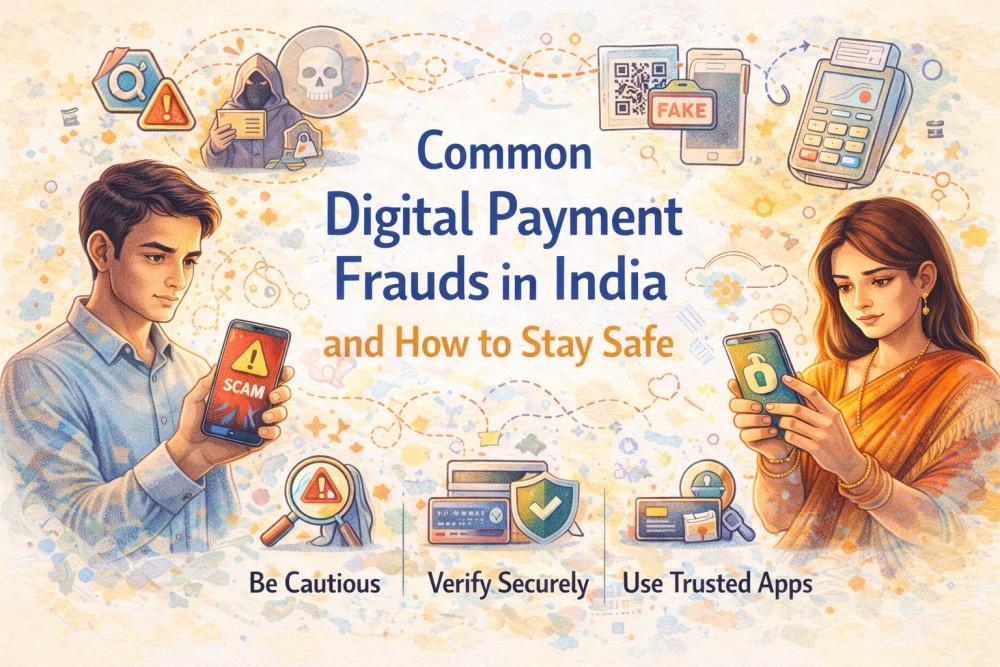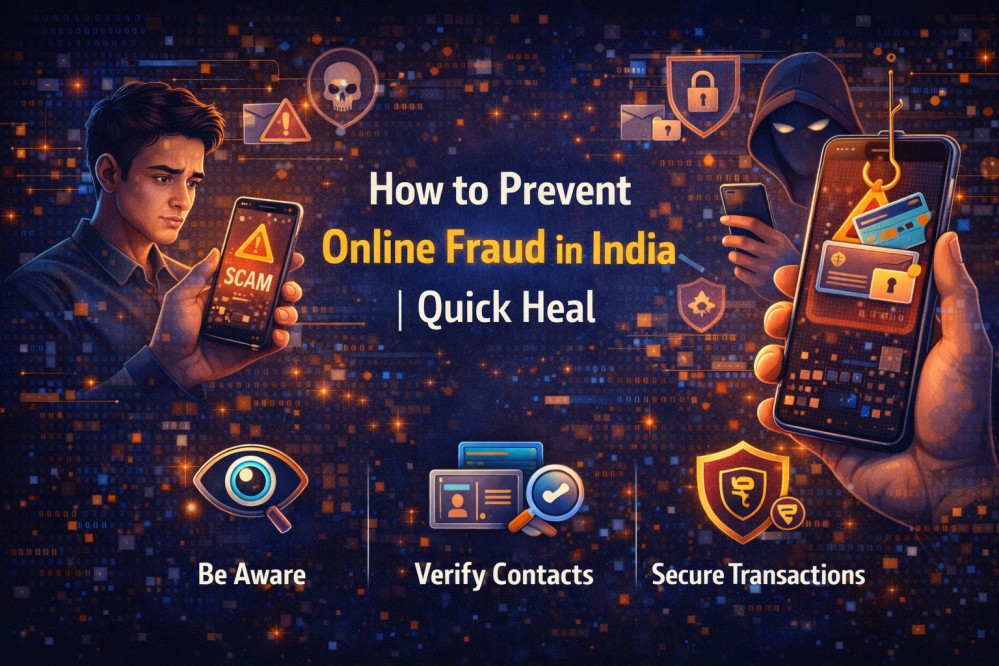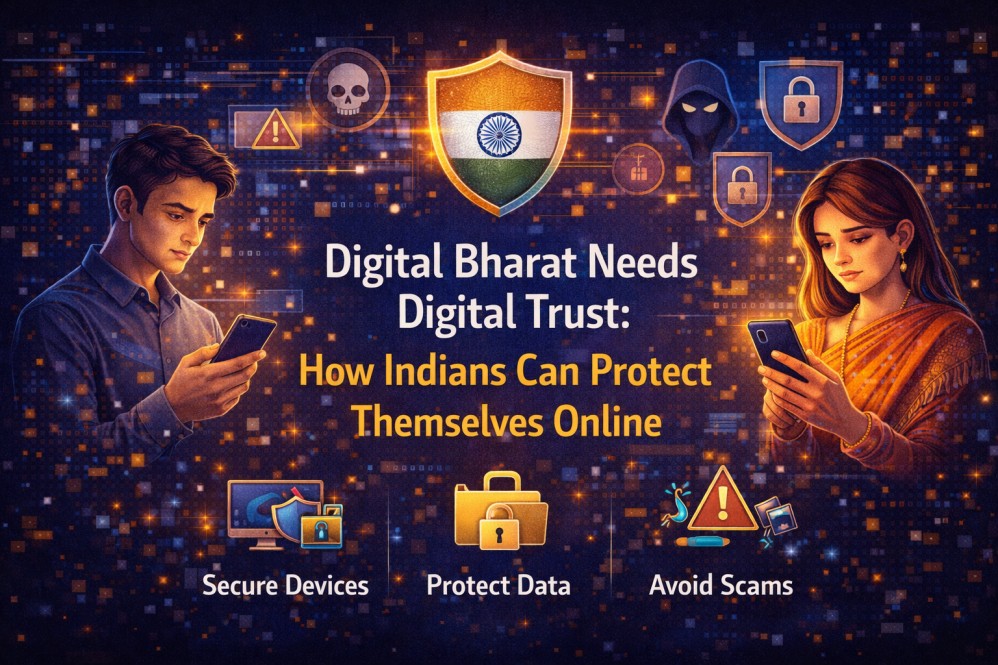
Nov

Cyber Safety for Families in Bihar: Practical Tips to Avoid Online Frauds and Scams
-
Quick Heal / 3 months
- November 24, 2025
- 0
Digital life is now part of daily life in Bihar. Children use mobiles for classes, elders pay bills online, and many families use UPI for almost everything. This comfort also brings risk. Fraudsters look for people who are busy, trusting or not very sure about online rules. That is why cyber safety for families is now as important as locking the main door at night.
In the last few years, cases of cybercrime in Bihar have gone up. Many of these cases involve families who clicked on a wrong link, installed a fake app or shared an OTP by mistake. The good news is that with simple steps, the right tools and a little alertness, you can avoid most of these traps.
Understanding Online Frauds and Threats
Online frauds usually follow a pattern. Someone tries to create fear, greed or urgency, and then pushes you to act fast. Families in Bihar often face:
- Messages about blocked bank accounts or KYC updates
- Fake job offers or work-from-home schemes
- Lottery, prize or lucky draw links
- Fake calls in the name of a bank, government office or courier
- WhatsApp messages promising quick loans or part-time work
These scams come through SMS, email, WhatsApp, social media or unknown calls. Many people still think “Ye hamare saath nahi hoga,” but that is precisely what fraudsters use to their advantage. Strong family cybersecurity and awareness can break this chain.
Common Online Scams in Bihar
Here are some common scams that target families across Bihar, from big cities to small towns:
- Phishing links for bank or UPI: You may get an SMS or email saying “Your account will be blocked, update KYC now” with a link. The page looks like your bank website, but it is fake. Once you enter your user ID, PIN or card details, the money can be stolen.
- Fake shopping and loan apps: Many families download apps promising heavy discounts or instant loans. These fake apps ask for access to contacts, photos and messages. Later, the fraudsters misuse this data, demand money or make unauthorised transactions.
- WhatsApp frauds using family photos or names: A scammer may use a display picture and name similar to your relative and send a message, “I changed my number, please send money urgently.” In confusion, people transfer money without calling to confirm.
- Remote access scams: The caller says, “I am calling from your bank or wallet support. I will help you solve the issue. Please install this app.” Once you install remote access software, they can see your screen and control your phone.
- Social media and OLX-style scams: Fraudsters act as buyers or sellers on online marketplaces. They send payment links or QR codes and say, “Sir, just scan this to receive money.” In reality, scanning the code sends money from your account.
To stay ahead of such tricks, families can also explore the Quick Heal Security, for trusted protective solutions that work in the background while you go about your daily work.
How Families are Usually Targeted
Very obvious scams do not fool most families. So fraudsters use soft and clever tactics:
- Emotional pressure: Messages about a sick relative, urgent money need or a child in trouble.
- Authority pressure: Pretending to be from a bank, police, government office or delivery company.
- Limited time offers: “Offer only for 5 minutes, click now or you will lose it”.
- Social media traps: Fake profiles that send friend requests, chat slowly, collect personal details and then misuse them.
- Phone calls with local language: Callers often speak in Hindi or a regional accent so that families feel more relaxed and trusting.
Scammers know that parents are busy and children are curious. That is why online safety tips for parents and elders are so important. A small family rule like “Never share OTP or PIN with anyone on call” can save big losses.
Quick Heal Bihar: Protecting Your Family Online
Awareness is the first step. The second is using strong security tools that keep watch all the time. Quick Heal offers dedicated solutions for home users in Bihar, primarily through the Quick Heal Total Security (Bihar) offering.
The Quick Heal Total Security suite is designed for families who use laptops and desktops for banking, shopping, studies and entertainment. Some key features that help families in Bihar stay safe are:
- Dark Web Monitoring: Alerts you if your email or other data appears on unsafe parts of the internet, so you can change passwords and secure accounts in time.
- AntiFraud.AI: Uses advanced checks to detect risky websites and fraud patterns, and warns you before you fall into a trap.
- Fraud Call Alert: Helps flag suspicious numbers and reduces the chances of getting cheated on a call.
- Safe banking and browsing protection: Gives extra safety while doing net banking or online payments and blocks harmful sites.
- Parental control options: Let parents manage what children can see, set time limits and block unsafe categories.
With such tools, cybersecurity for families in Bihar becomes easier to manage. You are not alone in this fight; the security solution stands like a guard for your digital life.
Practical Tips to Protect Your Family Online
Along with security software, these simple cyber safety tips can greatly reduce risk for your family:
- Use strong passwords that are not linked to your name, mobile number or date of birth.
- Do not share OTP, PIN or CVV with anyone, even if the caller says they are from the bank or any support team.
- Type website addresses directly or use bookmarks instead of clicking links in SMS or email.
- Before scanning any QR code for payment, confirm with the shopkeeper if you are sending or receiving money.
- Install apps only from trusted app stores and check ratings and reviews. Avoid unknown links to download apps.
- Talk to children regularly about online safety tips and what they should do if someone asks for photos, personal details or money.
- Use parental controls and set clear rules for screen time and social media. These are very useful online safety tips for parents.
- Log out after using net banking or essential accounts, especially on shared devices.
- Keep your operating system, browser and security solution updated.
- Encourage every family member to ask before clicking on something doubtful. It is better to be extra careful than to be sorry later.
These simple cybersecurity tips build strong family cybersecurity at home. When everyone follows the same rules, you create a safe digital habit for the whole family.
-
What is cyber safety for families in Bihar?
Cyber safety for families in Bihar means keeping every family member safe while using mobiles, laptops and the internet. It includes safe banking, careful use of social media, protecting personal data and teaching children how to behave safely online.
-
What are the common online scams in Bihar?
Families in Bihar often face phishing links for bank or UPI, fake shopping and loan apps, WhatsApp requests for urgent money, remote access scams and fraud on social media or marketplace platforms. Most of these scams try to create fear or urgency so that people act without thinking.
-
How can parents protect children online in Bihar?
Parents can start by talking openly to children about good and bad online behaviour. Use parental controls, set time limits, check which apps and games they are using and teach them never to share photos, school details or phone numbers with strangers
-
How can Quick Heal help families in Bihar stay safe online?
Quick Heal offers security solutions like Quick Heal Total Security (Bihar) that provide protection against unsafe sites, fake apps, fraud calls and many other threats. Features like Dark Web Monitoring, AntiFraud.AI and parental controls help families use the internet with more confidence.
-
What practical tips can families follow to stay safe online?
The first step that can be taken by parents is to discuss good and bad online behaviour with children openly. Apply parental restrictions, establish time frames, monitor what apps and games they are playing and educate them never to give photographs, school information or phone numbers to strangers.






